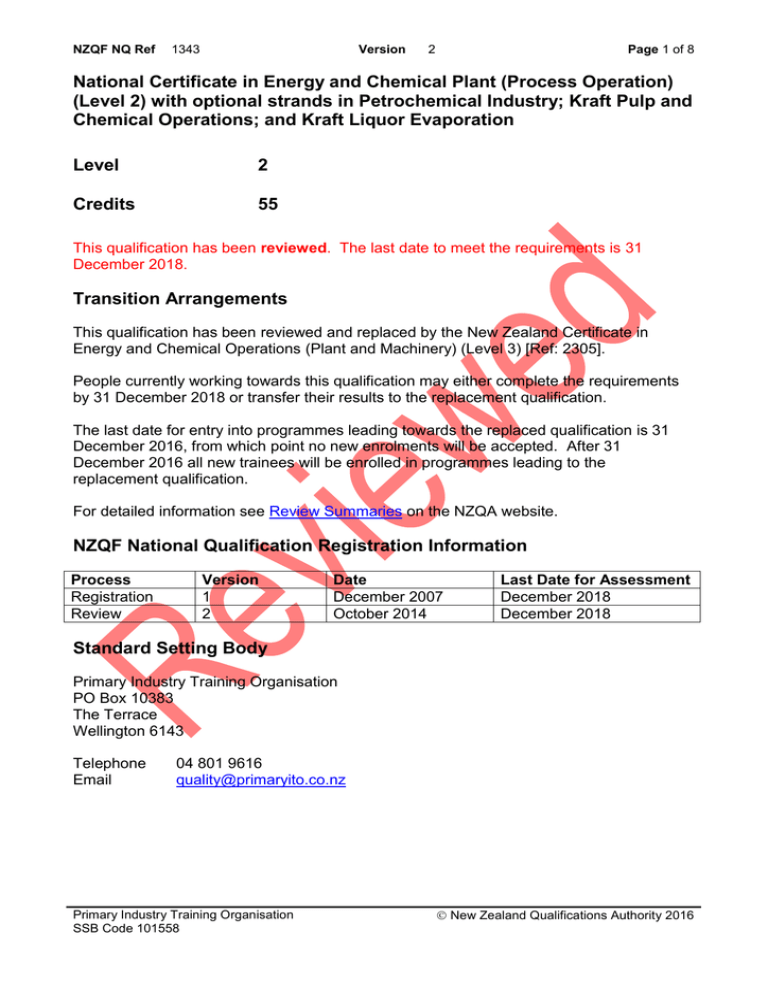National Certificate in Energy and Chemical Plant (Process Operation)
advertisement

NZQF NQ Ref Version 1343 Page 1 of 8 2 National Certificate in Energy and Chemical Plant (Process Operation) (Level 2) with optional strands in Petrochemical Industry; Kraft Pulp and Chemical Operations; and Kraft Liquor Evaporation Level 2 Credits 55 This qualification has been reviewed. The last date to meet the requirements is 31 December 2018. Transition Arrangements This qualification has been reviewed and replaced by the New Zealand Certificate in Energy and Chemical Operations (Plant and Machinery) (Level 3) [Ref: 2305]. People currently working towards this qualification may either complete the requirements by 31 December 2018 or transfer their results to the replacement qualification. The last date for entry into programmes leading towards the replaced qualification is 31 December 2016, from which point no new enrolments will be accepted. After 31 December 2016 all new trainees will be enrolled in programmes leading to the replacement qualification. For detailed information see Review Summaries on the NZQA website. NZQF National Qualification Registration Information Process Registration Review Version 1 2 Date December 2007 October 2014 Last Date for Assessment December 2018 December 2018 Standard Setting Body Primary Industry Training Organisation PO Box 10383 The Terrace Wellington 6143 Telephone Email 04 801 9616 quality@primaryito.co.nz Primary Industry Training Organisation SSB Code 101558 New Zealand Qualifications Authority 2016 NZQF NQ Ref Version 1343 2 Page 2 of 8 National Certificate in Energy and Chemical Plant (Process Operation) (Level 2) with optional strands in Petrochemical Industry; Kraft Pulp and Chemical Operations; and Kraft Liquor Evaporation Level 2 Credits 55 Purpose The National Certificate in Energy and Chemical Plant (Process Operation) (Level 2) with optional strands in Petrochemical Industry; Kraft Pulp and Chemical Operations; and Kraft Liquor Evaporation [Ref: 1343] recognises the competence, knowledge and skills of an entry level operator in the Energy and Chemical industry. The qualification has a compulsory core designed to develop a range of elementary operational skills and knowledge, required by all operators at this level in the Energy and Chemical industries. The core qualification can therefore be gained without the optional strands. The compulsory section of this qualification shares common safety and environmental standards with the National Certificate in Energy and Chemical Plant (Boiler Operation) (Level 2) [Ref: 1342]. This will allow the transfer of these industry generic skills into the broader Energy and Chemical industry. The Petrochemical Industry and Pulp and Paper Industry have added optional strands to this qualification that build on the core qualification and develop industry specific skills and knowledge required to work as an entry level operator in these industries. People who have completed the National Certificate in Energy and Chemical Plant (Process Operation) (Level 2) with optional strands [Ref: 1343] can continue on a career pathway to the National Certificate in Energy and Chemical Plant (Process Operation) with optional strands in Steam Generation; Turbine Operations; Waste Treatment; Refrigeration; Chemical Continuous Process; Chemical Batch Process; Solid Handling; Petrochemical Field Operations; Petrochemical Control Room Operations; Petrochemical Production Storage; Kraft Cycle Operations; Kraft Bleach and Chemical Operations; and Kraft Pulping and Chemical Plant [Ref: 1344]. The National Certificate in Energy and Chemical Plant (Boiler Operation) (Level 2) [Ref: 1342] and the optional industry strands in this qualification form a foundation for the optional strands in the National Certificate in Energy and Chemical Plant (Process Operation) with optional strands [Ref: 1344]. Replacement Information This qualification replaced the National Certificate in Energy and Chemical Plant (Process Operation) (Level 2) with optional strands in Steam Generation, Ancillary Operations, Geothermal, Waste Treatment, and Co-generation [Ref: 0140] and the National Certificate in Petrochemical Industry (Core) (Level 2) [Ref: 0977]. Primary Industry Training Organisation SSB Code 101558 New Zealand Qualifications Authority 2016 NZQF NQ Ref Version 1343 Page 3 of 8 2 Special Notes It is recommended that candidates possess knowledge in general educational areas of mathematics, chemistry, and physics. Evidence of that knowledge might be demonstrated by achievement in those subjects through credits at Level 2 or above. This knowledge will allow the development of skills relating to the handling and preparation of chemicals, the relating of the knowledge to thermodynamics, and the chemistry of pollutants. Credit Range Compulsory Level 2 credits Level 3 credits Level 4 credits Minimum totals Qualification totals Level 2 credits Level 3 credits Level 4 credits Minimum totals Qualification totals 19 25 8 52 Kraft Pulp and Chemical Operations Optional Strand C E 16 0-11 5 0-11 0-11 21 11 87 Elective 0-3 0-5 3 55 Kraft Liquor Evaporation Optional Strand Petrochemical Industry Optional Strand 15 7 22 77 Key: C = Compulsory E = Elective 21 10 15 46 101 Requirements for Award of Qualification Compulsory standards Elective – A minimum of 1 standard as specified The following strands are optional Petrochemical Industry Optional Strand Kraft Pulp and Chemical Operations Optional Strand Kraft Liquor Evaporation Optional Strand Award of NQF Qualifications Credit gained for a standard may be used only once to meet the requirements of this qualification. Unit standards and achievement standards that are equivalent in outcome are mutually exclusive for the purpose of award. The table of mutually exclusive standards is provided on the New Zealand Qualifications Authority (NZQA) website: http://www.nzqa.govt.nz/qualifications-standards/standards/standards-exclusionlist/. Reviewed standards that continue to recognise the same overall outcome are registered as new versions and retain their identification number (ID). Any version of a standard with the same ID may be used to meet qualification requirements that list the ID and/or that specify the past or current classification of the standard. Primary Industry Training Organisation SSB Code 101558 New Zealand Qualifications Authority 2016 NZQF NQ Ref 1343 Version Page 4 of 8 2 Detailed Requirements Compulsory The following standards are required Health > Occupational Health and Safety > Occupational Health and Safety Practice Id Title Level Credit 17602 Apply hazard identification and risk assessment procedures in the workplace 3 4 Manufacturing > Energy and Chemical Plant > Monitoring of Energy and Chemical Plant Id Title Level Credit 21452 Monitor energy and chemical plant and processes 3 5 Manufacturing > Energy and Chemical Plant > Operation of Energy and Chemical Plant Id Title Level Credit 3032 Operate valves on energy and chemical plant 4 8 3047 Interpret, use, and sketch process drawings for energy and chemical plant Operate common pumps, compressors and fans in a chemical and energy environment Demonstrate knowledge of pipework and fittings in the energy and chemical industry Demonstrate knowledge of basic thermodynamics and measurement for energy and chemical plant 3 2 2 5 2 4 3 6 4553 21459 21464 Manufacturing > Energy and Chemical Plant > Safety and Legislation for Energy and Chemical Plant Id Title Level Credit 21467 21468 21469 Store and handle chemicals for energy and chemical plant Demonstrate knowledge of energy and chemical plant pollutants and their control measures Operate energy and chemical plant personnel safety systems 3 8 2 5 2 5 Elective A minimum of 1 standard Manufacturing > Energy and Chemical Plant > Monitoring of Energy and Chemical Plant Id Title Level Credit 3054 3060 Read and interpret instruments used on energy and chemical plant Take product samples for energy and chemical plant Primary Industry Training Organisation SSB Code 101558 3 5 2 3 New Zealand Qualifications Authority 2016 NZQF NQ Ref 1343 Version Page 5 of 8 2 Petrochemical Industry Optional Strand The following standards are required Community and Social Services > Community and Workplace Fire and Emergency Management > Workplace Fire and Emergency Response Id Title Level Credit 3271 4647 Suppress fire with hand extinguishers and fixed hose reels Explain principles of fire science 2 1 2 1 Engineering and Technology > Petrochemical Industry > Petrochemical Operations Communication and Responses Id Title Level Credit 9618 9621 Use and interpret petrochemical industry documentation Interpret symbols, signs, and terminology specific to a petrochemical environment 3 3 2 2 Engineering and Technology > Petrochemical Industry > Petrochemical Process and Product Management Id Title Level Credit 19417 19418 Demonstrate knowledge of gas testing theory in a petrochemical environment Demonstrate knowledge of basic chemistry used in petrochemical environments 2 3 2 4 Health > Occupational Health and Safety > Occupational Health and Safety Practice Id Title Level Credit 17593 Apply safe work practices in the workplace 2 4 18426 Demonstrate knowledge of hazards associated with confined space 3 4 Kraft Pulp and Chemical Operations Optional Strand Meet the requirements of all of the following sets Kraft Pulp and Chemical Operations Optional Strand Compulsory Kraft Pulp and Chemical Operations Optional Strand Elective Kraft Pulp and Chemical Operations Optional Strand Compulsory The following standards are required Manufacturing > Wood Fibre Manufacturing > Pulp and Paper - Chemical Plants Id Title Level Credit 5680 Explain principles of the chemical recovery process in the production of kraft wood pulp Primary Industry Training Organisation SSB Code 101558 3 5 New Zealand Qualifications Authority 2016 NZQF NQ Ref 1343 Version Page 6 of 8 2 Manufacturing > Wood Manufacturing - Generic Skills > Wood Manufacturing Foundation Skills Id Title Level Credit 17860 17861 Demonstrate knowledge of principles of matter, energy, and chemistry used in wood manufacturing industries Demonstrate knowledge of principles of heat, energy, and work as used in wood manufacturing 2 8 2 8 Kraft Pulp and Chemical Operations Optional Strand Elective A minimum of 11 credits Manufacturing > Energy and Chemical Plant > Operation of Energy and Chemical Plant Id Title Level Credit 21456 Operate systems for boiler feedwater treatment 4 12 Manufacturing > Wood Fibre Manufacturing > Pulp and Paper - Chemical Plants Id Title Level Credit 3623 3624 3637 15821 21496 Process crude tall oil from tall oil soap as a by-product of wood pulp manufacturing Process crude sulphate turpentine and red oil as a byproduct of wood pulp manufacturing Describe principles of causticising and lime kiln operation in wood pulp manufacturing Prepare primary brine for electrolysis in pulp and paper chemical plants Load pulp and paper chemical by- products into road or rail tankers 3 5 3 3 2 8 3 8 4 3 Manufacturing > Wood Fibre Manufacturing > Pulp and Paper Manufacturing Skills Id Title Level Credit 3510 Test in-process pulp and chemicals as a pulp and paper manufacturing plant operator Service Sector > Driving > Driver Licence Endorsements Id Title 16718 Demonstrate knowledge of law and practice for the transport of Dangerous Goods by road 2 3 Level Credit 3 5 Kraft Liquor Evaporation Optional Strand The following standards are required Primary Industry Training Organisation SSB Code 101558 New Zealand Qualifications Authority 2016 NZQF NQ Ref 1343 Version Page 7 of 8 2 Manufacturing > Wood Fibre Manufacturing > Pulp and Paper - Chemical Plants Id Title Level Credit 3620 3622 3638 5680 Condition liquor using black liquor evaporator for wood pulp manufacturing Condition liquor using BLOX plant for wood pulp manufacturing Describe principles of black liquor combustion for wood pulp manufacturing Explain principles of the chemical recovery process in the production of kraft wood pulp 4 15 3 5 2 5 3 5 Manufacturing > Wood Manufacturing - Generic Skills > Wood Manufacturing Foundation Skills Id Title Level Credit 17860 17861 Demonstrate knowledge of principles of matter, energy, and chemistry used in wood manufacturing industries Demonstrate knowledge of principles of heat, energy, and work as used in wood manufacturing 2 8 2 8 Transition Arrangements This qualification contains standards that replace earlier standards. For the purposes of this qualification, people who have gained credit for the expiring standards are exempt from the requirement to gain credit for the replacement standards – see table below. Credit for Exempt from 3041 21456 3059 21452 3062, 3063 21467 3065 21468 3067 21469 4554, 4555, 16297, 16298, 16299 21461, 21462, 21463 Previous versions of the qualification Version 1 replaced the National Certificate in Energy and Chemical Plant (Process Operation) (Level 2) with optional strands in Steam Generation, Ancillary Operations, Geothermal, Waste Treatment, and Co-generation [Ref: 0140]. The Petrochemical Industry Optional Strand repalced the National Certificate in Petrochemical Industry (Core) (Level 2) [Ref: 0977]. Other standard setting bodies whose standards are included in the qualification Primary Industry Training Organisation SSB Code 101558 New Zealand Qualifications Authority 2016 NZQF NQ Ref 1343 Version Page 8 of 8 2 Fire and Rescue Services Industry Training Organisation Competenz NZ Motor Industry Training Organisation (Incorporated) The Skills Organisation Certification This certificate will display the logos of NZQA, the Primary Industry Training Organisation and the organisation that has been granted consent to assess against standards that meet the requirements of the qualification (accredited).. Classification This qualification is classified according to the classification system listed on the Directory of Assessment Standards (DAS) and the New Zealand Standard Classification of Education (NZSCED) system as specified below. DAS Classification Code Description 282 Manufacturing > Energy and Chemical Plant NZSCED Code Description 030301 Engineering and Related Technologies > Process and Resources Engineering > Chemical Engineering Quality Management Systems Providers and Industry Training Organisations must be granted consent to assess by a recognised Quality Assurance Body before they can register credits from assessment against standards. Organisation with consent to assess and Industry Training Organisations assessing against standards must engage with the moderation system that applies to those standards. Consent to assess requirements and the moderation system are outlined in the associated Consent and Moderation Requirements (CMR) for each standard. Primary Industry Training Organisation SSB Code 101558 New Zealand Qualifications Authority 2016


